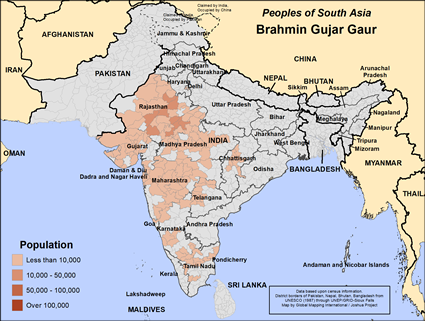Brahmin Gujar Gaur in India

Send Joshua Project a photo
of this people group. |

Map Source:
People Group data: Omid. Map geography: UNESCO / GMI. Map Design: Joshua Project.
|
| People Name: | Brahmin Gujar Gaur |
| Country: | India |
| 10/40 Window: | Yes |
| Population: | 272,000 |
| World Population: | 272,000 |
| Primary Language: | Hindi |
| Primary Religion: | Hinduism |
| Christian Adherents: | 0.00 % |
| Evangelicals: | 0.00 % |
| Scripture: | Complete Bible |
| Ministry Resources: | Yes |
| Jesus Film: | Yes |
| Audio Recordings: | Yes |
| People Cluster: | South Asia Forward Caste - Brahmin |
| Affinity Bloc: | South Asian Peoples |
| Progress Level: |
|
Introduction / History
Brahmans (often in the past spelled Brahmins) are the highest of the four varna (caste groups), and they speak many different languages wherever they live in South Asia. There has never been a comprehensive analysis of all the different types and subgroups of Brahmans. Traditionally in the varna system, Brahmans are considered as priests, but temple priest is a lowly position that no Brahman family wants their sons to aspire toward. Rather, there is strong pressure for higher education, particularly in computer science and engineering. Brahmans have a strong work ethic and are often leaders, whether politically, intellectually, spiritually, or socially.
There are many subgroups among the Brahmans. One of these are the Gaur Brahmans who live all over India. Their most common language is Hindi.
What Are Their Lives Like?
Gaur Brahmans are not vegetarians, and they drink alcohol and smoke tobacco.
They believe in adult marriages. Divorce is allowed for unfaithfulness and for difficulty in adjusting. Divorcees and the bereaved may marry again. When the father dies, the oldest son becomes the head of the home, while property is divided equally among the sons. They cremate the dead except for children who are less than three years old who are buried. There is a ten day period for death pollution.
Gaur Brahman people work in agriculture and in horticulture. They grow wheat, maize, mustard and sugar cane. Some are teachers. Women also work in agriculture.
They have community councils called panchayats that judge in matters such as divorce.
What Are Their Beliefs?
The Gaur Brahman are Hindus by religion and are mostly Shaiva. In some cases Brahman subgroups are defined by their theological distinctions such as Madhva Brahmans, who are defined by their dualist theology, though everyone does not actually hold those beliefs. However, many Brahman castes are made up of people who adhere to all the various philosophical and theological options espoused by modern Hindus, including hard core secularists and atheists. One can never predict what an individual Brahman might believe or disbelieve!
What Are Their Needs?
Gaur Brahmans as an influential and generally well-to-do community are not unlike the middle classes of most places. Their main needs involve relational strains that are usually kept behind closed doors. Modernization is breaking down family units which have been the glue to society for many generations, and loneliness is increasingly a problem. They are expected to "achieve it all," but ironically, achievement can be empty.
Prayer Points
Pray for Christ to reveal himself to Gaur Brahman leaders.
Pray for the eyes of Brahman hearts to be open to Jesus Christ as Lord and King.
Pray for Holy Spirit directed Christ followers to go to Brahman communities.
Pray for a disciple making movement to emerge among every Brahman community.
Pray for many to be prompted to faithfully pray for Brahmans.